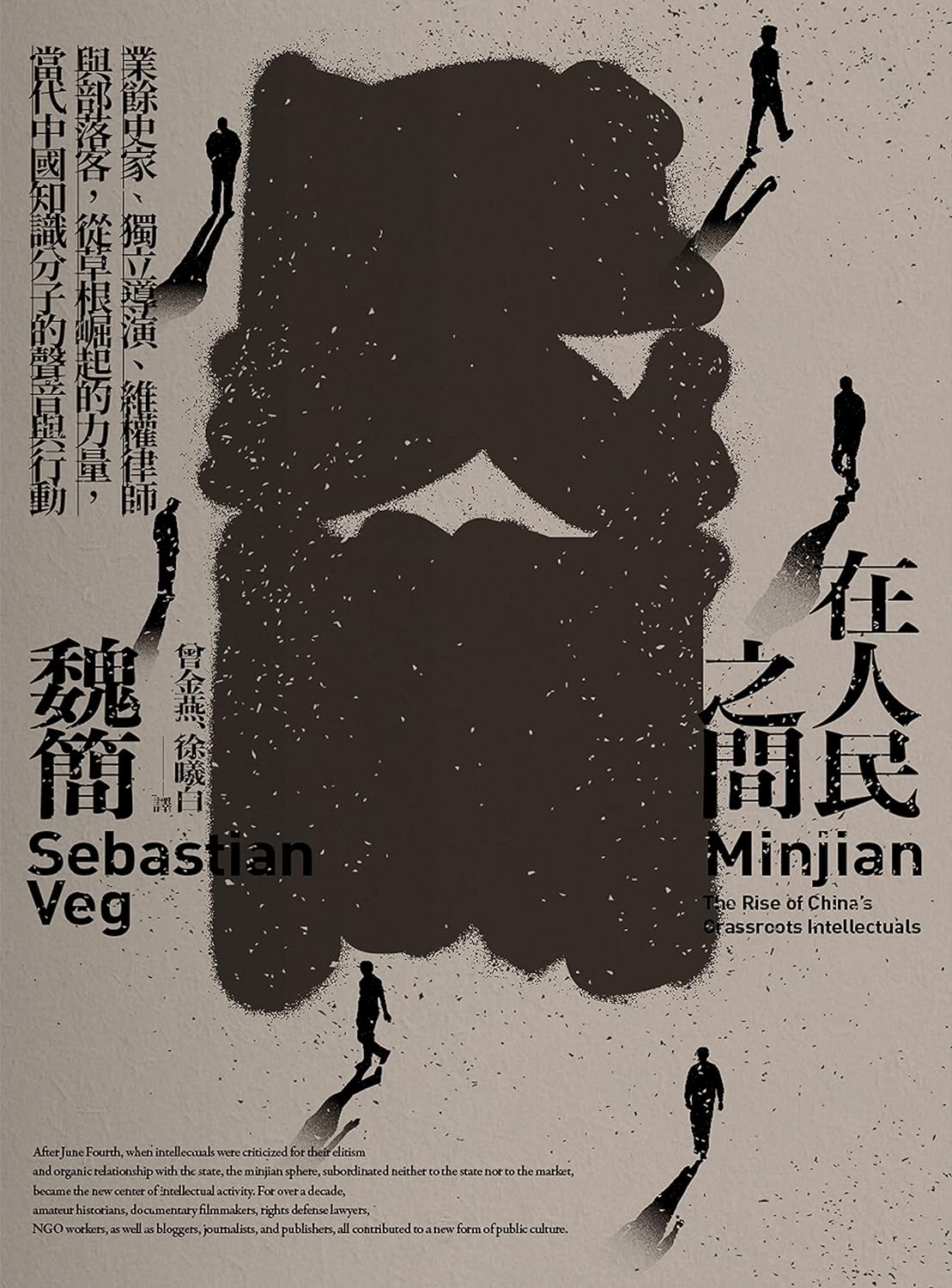WULOLIFE
《在人民之間:業餘史家、獨立導演、維權律師與部落客,當代中國知識分子的聲音與行動》作者:魏簡(Sebastian Veg)
《在人民之間:業餘史家、獨立導演、維權律師與部落客,當代中國知識分子的聲音與行動》作者:魏簡(Sebastian Veg)
Sale
Sold out
Regular price
€40,00 EUR
Regular price
Sale price
€40,00 EUR
Unit price
per
Tax included.
Shipping calculated at checkout.
Couldn't load pickup availability
Description
在逐漸噤聲的人民共和國,仍有一群知識分子不願沉默
他們非官方、無編制、在人民之間——自豪為「民間」
★中文版獨家收錄〈對話魏簡〉、〈對話賈樟柯〉★
在一九八九年民主運動受挫,一九九二年經濟改革重啟之後,一種新型態的草根知識有別於退縮於傳統領域的文人,他們積極與弱勢和邊緣群體合作;有他們強烈反對菁英修辭。他們非官方、無編制、在人民之間。
本書刻畫了一群深刻改變中國公共文化的草根思想-行動者,包括質疑官方說法的業餘史家、讓人民說話的獨立導演,以及分享實用知識的維權律師與NGO工作者等。他們開拓學術界與政府機構之外的新興公共領於具體而嚴峻的現實問題:毛以及沒有居住許可證的上訪者們。
魏簡深入當代中國社會表層下的變革伏流,分析民間知識分子的公共話語、介入行動和知識生產,將長期位於權力邊緣的草根知識分子群體——特別是女性知識分子——帶到中國思想史的版圖之中。
在威權國度的陰影下,深刻改變中國社會的知識力量!
■業餘史家——楊繼繩
退休後開始搜集關於大飢荒和文革的非官方檔案,二〇 〇八年在香港出版著作《墓碑》。「來自全國各地的大量給我以堅定而熱情地支持。這說明,真相有政權力構築的銅墻鐵壁!」
■獨立導演——賈樟柯
在體制外拍攝電影的第一代導演,專注於被主流忽視的題材。「我一直反感那種莫名其妙的職業優越感,而業餘精神中則包含著平等與公正,以及對命運的關注和對普通人的體恤之情。」
■ 維權律師——許志永
在孫志剛案、公盟創立與訪民議題上發揮重要作用,後因新公民運動而被捕入獄。「我有能力在這個體制中過上優越的生活,但是,任何的特權都會讓我感到羞恥。我選擇站在無權無勢者一邊,一起感一起承受黑監獄的野蠻暴力。」
■ 部落客——韓寒
高中肄業後成為暢銷小說家與賽車手,常對政治議題發表評論。「我很討厭政治,我很熱愛文藝。只是我不喜歡我所熱愛的文藝被我所討厭的政治所妨礙。」
(更多民間知識分子小傳詳見本書附錄)
好評推薦
▍專文引讀
吳介民/中央研究院社會學研究所研究員
本書雖然聚焦知識分子在天安門事件後的轉進,作為一個抵抗的社會網絡,可以貫穿詮釋中國近現代史。草根知識分子的介入,為中國傳統的民間注入了一股新力量,也重新界定了民間。魏簡在結論說:「民間」一詞凸因為民間行動者未必具有充分的公民權利意識。儘管民間不等於公民社社會關係演變的新一層認識,也對西方公民社會理論提供了新的批判視角。
趙思樂/記者、《她們的征途》作者
對於這樣一本論述中國鮮為人知的面向的研究專著,必須回到評價其價值的最關鍵問題:它是否抓住了一個重要面向的本質特徵,並為其作了可靠的呈現?作為研究和書寫中國民間運動多年的記者和作者,我認為兩個問題的答案都是肯定的。中國的新興知識群體,更傾向於討論具體的社會問題,在自我定位和關注上更接近於社會底層和弱勢群體,而魏簡此書為這一重要現象作了可敬、可信的論述。
▍強力推薦
何明修/台灣大學社會學系教授
異議者從沒有沉默過,他們從社會問題報導、國家暴力的口述史紀錄、紀錄片與藝術創作、維權倡議等,提出其批判。他們改寫了從五四運動以降中國知識分子的傳統,丟棄了自拒絕安逸的學院體制,積極擁抱商業化的媒體與網路媒介。在習近平主政下,這群草根知識分子的處境更形艱困,新一代的異議者也將會以不同的姿態與管道持續發聲。
何欣潔/端傳媒台灣組主編
對當代知識分子來說,於江湖與廟堂之外,「民間」如何可能?宏大信念如何化為日復一日的草根行動?無論在哪一個社會,這兩大提問都無比重要。但少數行動者的親身實踐,又往往因發生在基層、零細、易折,而罕見於史冊。魏簡的疏理,是一份相對完整而珍貴的歷史紀錄。
李志德/鏡文學副總編輯
深切的遺憾油然而生:原來當今中國失去了這麼多願意追求文明,奉獻自我的知識分子和專業人士;又有多少讓中國比現在更進。
林木材/台灣國際紀錄片影展策展人
在中、港、台當下的政治語境下,魏簡的新書《在人民之間》能在台灣出版,無疑別具意義。如果「知識分子」意味著一種高然的獨立與批判精神,那麼魏簡長期的觀察、書不只為這一代中國知識分子寫下紀錄,生存與轉型,以及知識分子的種子於民間發芽後,還可以是什麼、做些什麼。書的核心根源於一種對公義、良心的召喚,書中的許多辯證。
邱伊翎/國際特赦組織台灣分會秘書長
大多數的媒體報導或調查研究,都集中在中國政府的各種壓制手段,此書提供了另一種視野,描述中國在地的草根行動者,如何跳脫傳統知識分子的框架,進行組織、形成網絡。內容精彩,值得一讀。
(依姓氏筆畫排序)
▍各界好評
在中國及其他地區威權主義不斷深化的時代,本書提供了壓迫體制陰影下公民韌性的重要見解。作者以獨特的方式,展現不同角色的獨立和批判性民間知識分子如何Eva Pilsner,倫敦國王學院法學教授
中國知識分子過去以國家為重,「以天下為己任」。但商業化和不受道德認可的政府則催生出新一代知識分子,他們更加關注社會的具體問精確剖Joseph Fewsmith,波教授
魏簡及時且深入的研究考察了中國「草根知識分子」羅鵬(Carlos Rojas,杜克大學亞洲和中東研究教授
有時令中國領導人苦惱的是,中國在共產黨控制之外發展出一個儘管是非官方的,但具有相當魏簡則提供其全覽,雷格・卡爾霍恩(Craig Calhoun,亞利桑那州立授
《在人民之間》提供了數位時代新型知識分子的全面性考察。從獨立電影人、歷史學家到律師和記者,這些草根知識分子改變了中國的公共文化以及身為魏簡在更廣泛的歷史變遷脈絡中講述活躍分子的迷人故事,也是教學上的絕佳資源。――楊國斌(Guobin Yang,賓州大學社會學教授
New York Review of Books)
▎作者/譯者簡介
作者:魏簡(Sebastian Veg)
現任法國社會科學高等研究院中國思想史教授、香港大學名譽教授。研究領域為中國現當代思想史、知識分子與文學。他曾長駐香港,先後任法國現代中國研究中心研究員、東京大學東洋文化研究所訪問學者、香China Perspectives記憶:從批判性爭論到重估歷史》、《太陽花與雨傘:臺灣與香港的社會行動、表達實踐與政治文化》,著有《在虛構與現實之間:二十世紀初的文學、現代主義和民主》等書。
譯者:曾金燕
香港大學社會工作及社會行政學系博士,美國科爾比學院現任瑞典隆德大學東亞與東南亞研究中心博士後研究員。研究領域為中國的文化與政治、知識分子身分與社會行動、社會性別與性、民族與女性書寫。著有《中國女權:公民知識分子的誕生》,獲2017年香港出版雙年獎社科類獎項,參與製作、導演、發行《自由城的囚徒》、《致劉霞》、《凶年之畔》、《喊叫與耳語》等紀錄片電影,以筆名發表中、法、英文小說與詩歌等。
譯者:徐曦白
牛津大學政治與國際關係博士候選人,研究領域為中國公民社會組織與國家的關係。文章見於澎湃新聞、界面新聞、端傳媒等媒體,譯有《資本主義還有未來嗎?》、《瓶頸:新的機會平等理論》、《自由主義被遺忘的歷史》等書。
他們非官方、無編制、在人民之間——自豪為「民間」
★中文版獨家收錄〈對話魏簡〉、〈對話賈樟柯〉★
在一九八九年民主運動受挫,一九九二年經濟改革重啟之後,一種新型態的草根知識有別於退縮於傳統領域的文人,他們積極與弱勢和邊緣群體合作;有他們強烈反對菁英修辭。他們非官方、無編制、在人民之間。
本書刻畫了一群深刻改變中國公共文化的草根思想-行動者,包括質疑官方說法的業餘史家、讓人民說話的獨立導演,以及分享實用知識的維權律師與NGO工作者等。他們開拓學術界與政府機構之外的新興公共領於具體而嚴峻的現實問題:毛以及沒有居住許可證的上訪者們。
魏簡深入當代中國社會表層下的變革伏流,分析民間知識分子的公共話語、介入行動和知識生產,將長期位於權力邊緣的草根知識分子群體——特別是女性知識分子——帶到中國思想史的版圖之中。
在威權國度的陰影下,深刻改變中國社會的知識力量!
■業餘史家——楊繼繩
退休後開始搜集關於大飢荒和文革的非官方檔案,二〇 〇八年在香港出版著作《墓碑》。「來自全國各地的大量給我以堅定而熱情地支持。這說明,真相有政權力構築的銅墻鐵壁!」
■獨立導演——賈樟柯
在體制外拍攝電影的第一代導演,專注於被主流忽視的題材。「我一直反感那種莫名其妙的職業優越感,而業餘精神中則包含著平等與公正,以及對命運的關注和對普通人的體恤之情。」
■ 維權律師——許志永
在孫志剛案、公盟創立與訪民議題上發揮重要作用,後因新公民運動而被捕入獄。「我有能力在這個體制中過上優越的生活,但是,任何的特權都會讓我感到羞恥。我選擇站在無權無勢者一邊,一起感一起承受黑監獄的野蠻暴力。」
■ 部落客——韓寒
高中肄業後成為暢銷小說家與賽車手,常對政治議題發表評論。「我很討厭政治,我很熱愛文藝。只是我不喜歡我所熱愛的文藝被我所討厭的政治所妨礙。」
(更多民間知識分子小傳詳見本書附錄)
好評推薦
▍專文引讀
吳介民/中央研究院社會學研究所研究員
本書雖然聚焦知識分子在天安門事件後的轉進,作為一個抵抗的社會網絡,可以貫穿詮釋中國近現代史。草根知識分子的介入,為中國傳統的民間注入了一股新力量,也重新界定了民間。魏簡在結論說:「民間」一詞凸因為民間行動者未必具有充分的公民權利意識。儘管民間不等於公民社社會關係演變的新一層認識,也對西方公民社會理論提供了新的批判視角。
趙思樂/記者、《她們的征途》作者
對於這樣一本論述中國鮮為人知的面向的研究專著,必須回到評價其價值的最關鍵問題:它是否抓住了一個重要面向的本質特徵,並為其作了可靠的呈現?作為研究和書寫中國民間運動多年的記者和作者,我認為兩個問題的答案都是肯定的。中國的新興知識群體,更傾向於討論具體的社會問題,在自我定位和關注上更接近於社會底層和弱勢群體,而魏簡此書為這一重要現象作了可敬、可信的論述。
▍強力推薦
何明修/台灣大學社會學系教授
異議者從沒有沉默過,他們從社會問題報導、國家暴力的口述史紀錄、紀錄片與藝術創作、維權倡議等,提出其批判。他們改寫了從五四運動以降中國知識分子的傳統,丟棄了自拒絕安逸的學院體制,積極擁抱商業化的媒體與網路媒介。在習近平主政下,這群草根知識分子的處境更形艱困,新一代的異議者也將會以不同的姿態與管道持續發聲。
何欣潔/端傳媒台灣組主編
對當代知識分子來說,於江湖與廟堂之外,「民間」如何可能?宏大信念如何化為日復一日的草根行動?無論在哪一個社會,這兩大提問都無比重要。但少數行動者的親身實踐,又往往因發生在基層、零細、易折,而罕見於史冊。魏簡的疏理,是一份相對完整而珍貴的歷史紀錄。
李志德/鏡文學副總編輯
深切的遺憾油然而生:原來當今中國失去了這麼多願意追求文明,奉獻自我的知識分子和專業人士;又有多少讓中國比現在更進。
林木材/台灣國際紀錄片影展策展人
在中、港、台當下的政治語境下,魏簡的新書《在人民之間》能在台灣出版,無疑別具意義。如果「知識分子」意味著一種高然的獨立與批判精神,那麼魏簡長期的觀察、書不只為這一代中國知識分子寫下紀錄,生存與轉型,以及知識分子的種子於民間發芽後,還可以是什麼、做些什麼。書的核心根源於一種對公義、良心的召喚,書中的許多辯證。
邱伊翎/國際特赦組織台灣分會秘書長
大多數的媒體報導或調查研究,都集中在中國政府的各種壓制手段,此書提供了另一種視野,描述中國在地的草根行動者,如何跳脫傳統知識分子的框架,進行組織、形成網絡。內容精彩,值得一讀。
(依姓氏筆畫排序)
▍各界好評
在中國及其他地區威權主義不斷深化的時代,本書提供了壓迫體制陰影下公民韌性的重要見解。作者以獨特的方式,展現不同角色的獨立和批判性民間知識分子如何Eva Pilsner,倫敦國王學院法學教授
中國知識分子過去以國家為重,「以天下為己任」。但商業化和不受道德認可的政府則催生出新一代知識分子,他們更加關注社會的具體問精確剖Joseph Fewsmith,波教授
魏簡及時且深入的研究考察了中國「草根知識分子」羅鵬(Carlos Rojas,杜克大學亞洲和中東研究教授
有時令中國領導人苦惱的是,中國在共產黨控制之外發展出一個儘管是非官方的,但具有相當魏簡則提供其全覽,雷格・卡爾霍恩(Craig Calhoun,亞利桑那州立授
《在人民之間》提供了數位時代新型知識分子的全面性考察。從獨立電影人、歷史學家到律師和記者,這些草根知識分子改變了中國的公共文化以及身為魏簡在更廣泛的歷史變遷脈絡中講述活躍分子的迷人故事,也是教學上的絕佳資源。――楊國斌(Guobin Yang,賓州大學社會學教授
New York Review of Books)
▎作者/譯者簡介
作者:魏簡(Sebastian Veg)
現任法國社會科學高等研究院中國思想史教授、香港大學名譽教授。研究領域為中國現當代思想史、知識分子與文學。他曾長駐香港,先後任法國現代中國研究中心研究員、東京大學東洋文化研究所訪問學者、香China Perspectives記憶:從批判性爭論到重估歷史》、《太陽花與雨傘:臺灣與香港的社會行動、表達實踐與政治文化》,著有《在虛構與現實之間:二十世紀初的文學、現代主義和民主》等書。
譯者:曾金燕
香港大學社會工作及社會行政學系博士,美國科爾比學院現任瑞典隆德大學東亞與東南亞研究中心博士後研究員。研究領域為中國的文化與政治、知識分子身分與社會行動、社會性別與性、民族與女性書寫。著有《中國女權:公民知識分子的誕生》,獲2017年香港出版雙年獎社科類獎項,參與製作、導演、發行《自由城的囚徒》、《致劉霞》、《凶年之畔》、《喊叫與耳語》等紀錄片電影,以筆名發表中、法、英文小說與詩歌等。
譯者:徐曦白
牛津大學政治與國際關係博士候選人,研究領域為中國公民社會組織與國家的關係。文章見於澎湃新聞、界面新聞、端傳媒等媒體,譯有《資本主義還有未來嗎?》、《瓶頸:新的機會平等理論》、《自由主義被遺忘的歷史》等書。
